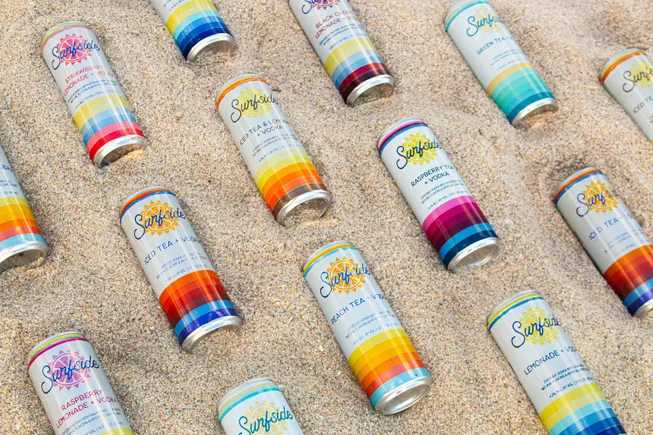During the second half of the twentieth century, the unofficial drink of Philadelphia's Fishtown neighborhood came in a milk carton. But it wasn’t the popular dairy offering. It was iced tea.
The admiration for iced tea in the city caught the attention of Matt Quigley and his brother Bryan, who ran a regional craft spirits business. They spotted an untapped market for an alcoholic version of iced tea.
“People in the area are drinking a heck of a lot of tea,” Matt Quigley said in an interview with Food Dive. “We found [hard tea] is a massive category, and only a few players had been in it.”
The result was Surfside Iced Tea, a vodka-infused tea and lemonade brand that debuted in 2022. It didn’t take long for the beverage to catch on with consumers beyond the City of Brotherly Love. Surfside was the second best-selling spirits-based RTD brand in the U.S. last year after High Noon, according to an analysis by Impact Databank.
As more consumers look for canned cocktails with high-quality spirits, Surfside believes it can build a brand that competes with more established players. While White Claw has stabilized its position as the top malt-based seltzer, Surfside thinks it can occupy a similar space for vodka-based cocktails.
“We want to be the White Claw of this category,” said Clement Pappas, Surfside’s CEO. “When the dust settles and the music stops, we want to be the brand that is synonymous with [vodka cocktails].”
Surfside is owned by Stateside Brands, which itself is an extension of the Quigley brothers’ craft vodka business. In addition to Surfside, the company sells Stateside vodka and a line of vodka sodas.
But Surfside, which is planning to expand beyond the Northeast this year, has proven to be the most successful. The brand sold 4.9 million cases to retailers in 2024, experiencing 378% growth compared to the previous year.
Surfside’s hard tea and lemonade drinks.
Courtesy of Surfside
For years, Boston Beer-owned Twisted Tea was one of the only dominant players in hard iced tea. Quigley, who is president of Surfside, said there was an opening for a better-for-you offering with lower sugar that uses vodka instead of malt liquor.
Pappas said the stratospheric growth of malt-based beer alternatives in the late 2010s “went boom-bust pretty quick,” because consumers began craving higher quality spirits in the drinks.
But beyond the use of spirits, the Surfside team believes its success comes down to its simplicity and packaging.
The brand learned from others in the RTD category in recent years, including Bud Light Seltzer which was “highly confusing to the consumer,” Quigley said. Surfside plans to stay in vodka and is not planning to introduce drinks infused with other spirits such as gin or tequila.
“Our whole mindset is to keep the message really, really simple so people know who we are,” Quigley said.
Spirits-based RTDs are gaining traction with consumers looking for bar-quality drinks they can drink at home or parties. Sales in the category are projected to increase by 6% annually through 2028, according to IWSR.
Source link
